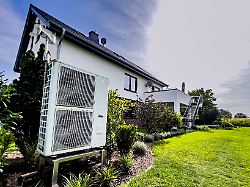Building Energy Act starts
Geywitz: Replacing the heating system early can be worthwhile
December 30, 2023, 10:07 a.m
Listen to article
This audio version was artificially generated. More info | Send feedback
Rarely has a government fought as much internally as the traffic light coalition over the heating law. Now it comes into force. But it has little to do with the original design. There is only a few property owners under pressure to act, at least for the time being.
There was bitter debate about this for months – now the new heating law comes into force at the beginning of the year. The most important message: The vast majority of homeowners don’t have to do anything at first. Functioning heaters can continue to be operated. Shortly before the start of the new Building Energy Act, there is finally clarity about future state funding.
Even if the pressure to act is no longer as great as envisaged in the original draft law, Building Minister Klara Geywitz encourages consumers to replace their gas heating more quickly. “It may be worthwhile to replace the heater more quickly and not install a new gas heater,” Geywitz told the newspapers of the Funke media group. One incentive is the climate speed bonus in heating subsidies. But everyone has to make the decision for themselves, the minister added.
The core of the Building Energy Act is the requirement that newly installed systems be powered by at least 65 percent renewable energy. But unlike originally planned, this only affects a few households – namely only new buildings in new development areas. In general, functioning heaters can continue to be operated. Broken heaters can be repaired.
Recently clarity about subsidies
For all other households, the new regulation will only apply once there is a municipal heating plan. It should be available in large cities from mid-2026 and for the remaining municipalities from mid-2028. Homeowners should then have clarity as to whether, for example, they should be connected to a district heating network or whether they should look for their own decentralized solutions for a new heating system – for example a heat pump. Sooner or later, most house and apartment owners will have to buy a new heating system.
The law remains politically controversial. The Union rejects it in its entirety and calls for it to be abolished. In the event of a change of government, reform or even abolition could be at the top of the strike list.
There has recently been clarity about the new funding guidelines and subsidies for investment costs. The most important innovation: There is a speed bonus for owner-occupiers for replacing old fossil heating systems at an early stage. This should provide an incentive to switch, even if the heating is still working. The bonus is granted for the replacement of functional oil, coal, gas or night storage heaters as well as biomass and gas heaters that are more than twenty years old. A planned expansion of the speed bonus for replacing particularly old heaters has been canceled for cost reasons.
The maximum funding rate for the installation of heating systems should be increased by up to 70 percent for private individuals. Every owner who installs climate-friendly heating should be able to receive 30 percent funding. Another 30 percent is reserved for low-income earners who own their own home. There is also a “climate speed bonus” of 20 percent, which reduces over time. These pillars can be combined to a maximum of 70 percent.
Suddenly there is a boom in gas and oil heating
Geywitz defended the mandatory consultation that will be required in the future before installing a new gas heating system. “It makes sense to point out to people that a gas heater is becoming an expensive heater – simply because the price of CO2 is rising,” she said. “If we don’t communicate the consequences of technological disruption, we could be in for a rude awakening.”
The long wrangling over the heating law apparently also had the effect that many homeowners purchased new gas heating – the industry is heading for a record. “Most of the people quickly invested in gas heating in order to evade the GEG’s requirements,” said Ralf Kiryk, head of department at the Federal Association of the German Heating Industry.
According to figures from the association, there was a 38 percent increase in sales of gas heaters to around 694,500 units by the end of October, and an increase of 107 percent to 94,500 for oil heaters. Sales of heating heat pumps rose by 75 percent to 320,500. However, interest in heat pumps has waned as a result of the GEG debate.
According to a study by the energy industry association BDEW in November, almost half of the 41.9 million apartments were heated with natural gas in 2023. Oil heating is in second place with almost a quarter. The Ministry of Construction points out: In most cases it makes sense to use heating with renewable energies now. This helps climate protection and is also economically attractive because there is financial support – even if the heating is still working.
